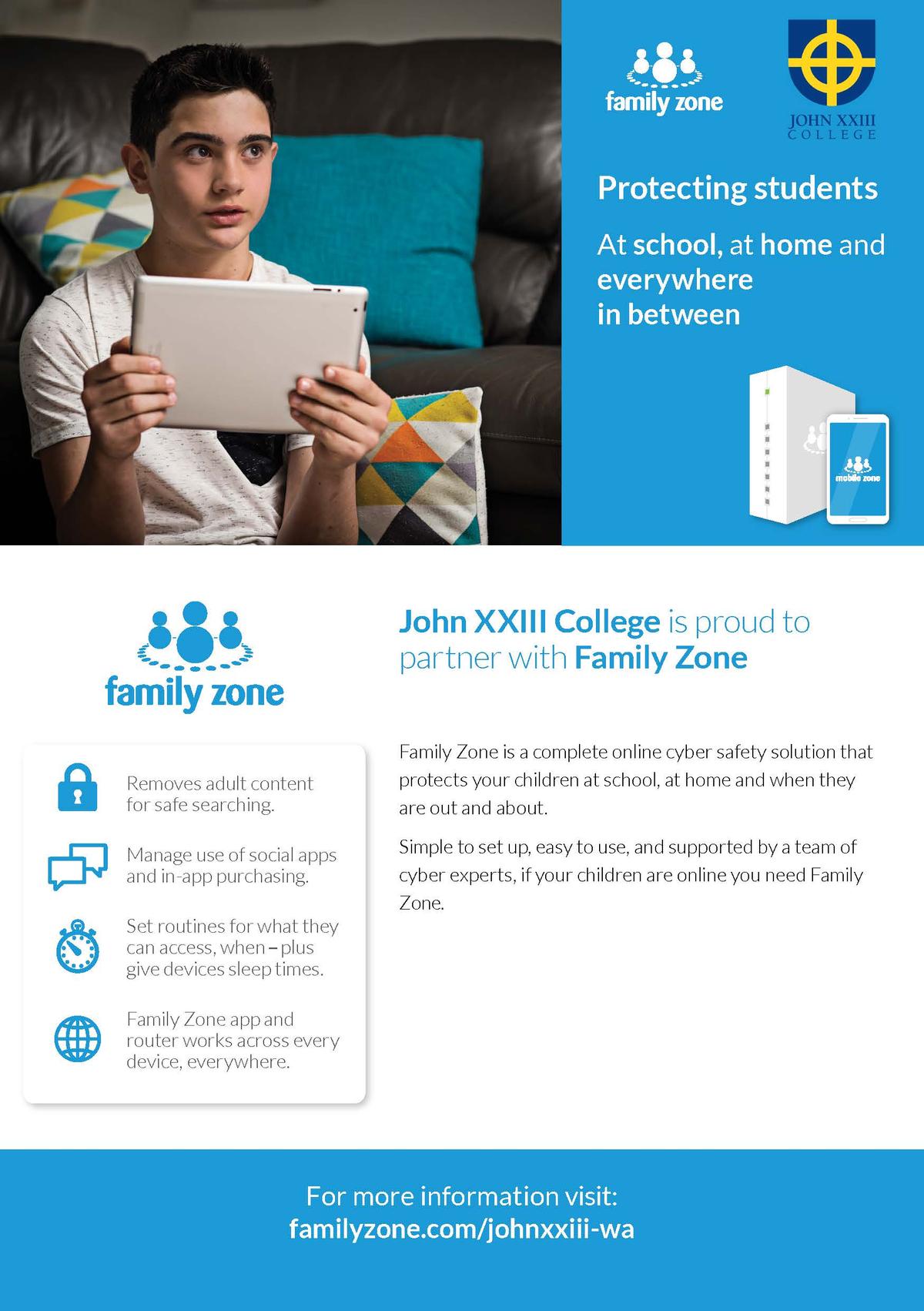Family Zone & Cyber Safety

Download Family Zone
Make use of the Family Zone Accounts which we are offering to John XXIII College families for free, as part of our College contract negotiations until April 2020.
By setting up a private Family Zone account, you can apply age-appropriate parental controls on every device your child has access to, in any location. To find out more visit https://www.familyzone.com/johnxxiii-wa
Family Zone Webinar recordings
For those that were unable to make the Family Zone webinars, we have recorded both sessions for you to view in your own time, and they are available here: https://www.familyzone.com/johnxxiii-wa
Webinar topics are:
- Getting Started with Family Zone
- Advanced with Family Zone
Meet Generation Alpha
Meet Generation Alpha: the first generation to be born into a complex, always-connected world, where the distinctions between “online” and “offline” are almost meaningless. Parenting these kids raises new challenges for mums and dads. How to be a leader when your children are facing a digital future that’s impossible to fully understand?
Experts are still waffling on what to call the cohort of kids born in the last decade, but Australian social researcher Mark McCrindle’s preferred term - Generation Alpha - is catching on both here and abroad.
If you have a child aged 10 or under, you’ve observed their characteristics at first hand. These are kids who’ve cut their teeth on technology - figuratively and otherwise. Who learn the fundamentals of Artificial Intelligence from their favourite toys. Whose adult occupations have yet to be invented.
They are the kids born since 2010 - not at all coincidentally, the year the iPad was released, Instagram debuted and the word “app” was Word of the Year.
“They are the first generation of children to be shaped in an era of portable digital devices,” explains demographer Ashley Fell of McCrindle research, “and, for many, their pacifiers have not been a rattle or a set of keys but a smartphone or a tablet.”
And that means an entirely new set of challenges for parents. Here, according to experts, are the key ones:
Practical skills
Ask yourself, are your child’s screen-time habits setting them up for success in putting together Ikea furniture in later life? It’s not an entirely fanciful question.
Children in this generation spend so much time in front of screens that their practical capabilities are going to need special attention.
That includes physical strength and coordination, social competencies, financial literacy and emotional resilience.
None of these areas really gets a workout online - but they are key to success in the offline world.
Wellbeing worries
Research shows that cyberbullying accounts for a big proportion of bullying incidents in schools and workplaces. In the last five years, almost half of parents now expect schools to do more to support their children’s wellbeing, and over a quarter have “significantly or somewhat” increased those expectations.
"For many, their pacifiers have not been a rattle or a set of keys but a smartphone or a tablet.”
Global thinking
No matter where they are in the world, children in this generation are influenced by a genuinely global pop culture. They see the same movies, listen to the same music, follow the same fashions and celebrities - and even eat the same food.
When they enter the workforce, they will be competing within a global context too. That means it’s crucial for parents to equip their youngsters with the competencies that the digital world will not necessarily supply - and high on the list, say experts, are critical thinking skills.
Hard digital skills
Our kids have no trouble playing games or navigating social media. But the jobs of the future will demand much higher-level technological competencies.
The World Economic Forum predicts that 65% of kids entering primary school today will be employed in the future in jobs that don’t yet exist - so hard digital skills in robotics, coding, social media marketing, app development and data analytics will be critical to their success.
The World Economic Forum predicts that 65% of kids entering primary school today will be employed in the future in jobs that don’t yet exist.
Visual literacy
Not surprisingly, the YouTube generation shows a marked preference for video over text. Notes Fell, “We have an emerging generation, many of whom are opting to watch a video summarising an issue rather than read an article discussing it.”
But formal education remains heavily text-based, and with one in two Generation Alphas predicted to earn a university degree, it’s vital that parents reinforce the skills of traditional literacy: the ability to read and reflect critically, to delay gratification, to tolerate boredom and visual blandness, to evaluate sources, and to read for accuracy, logic and evidence.
Generation Alpha kids face an exciting but uncharted future. To prepare them with the life skills and the people skills they’ll need to thrive, say experts, it’s more important than ever that parents take a strong leadership role in training, education and support.


